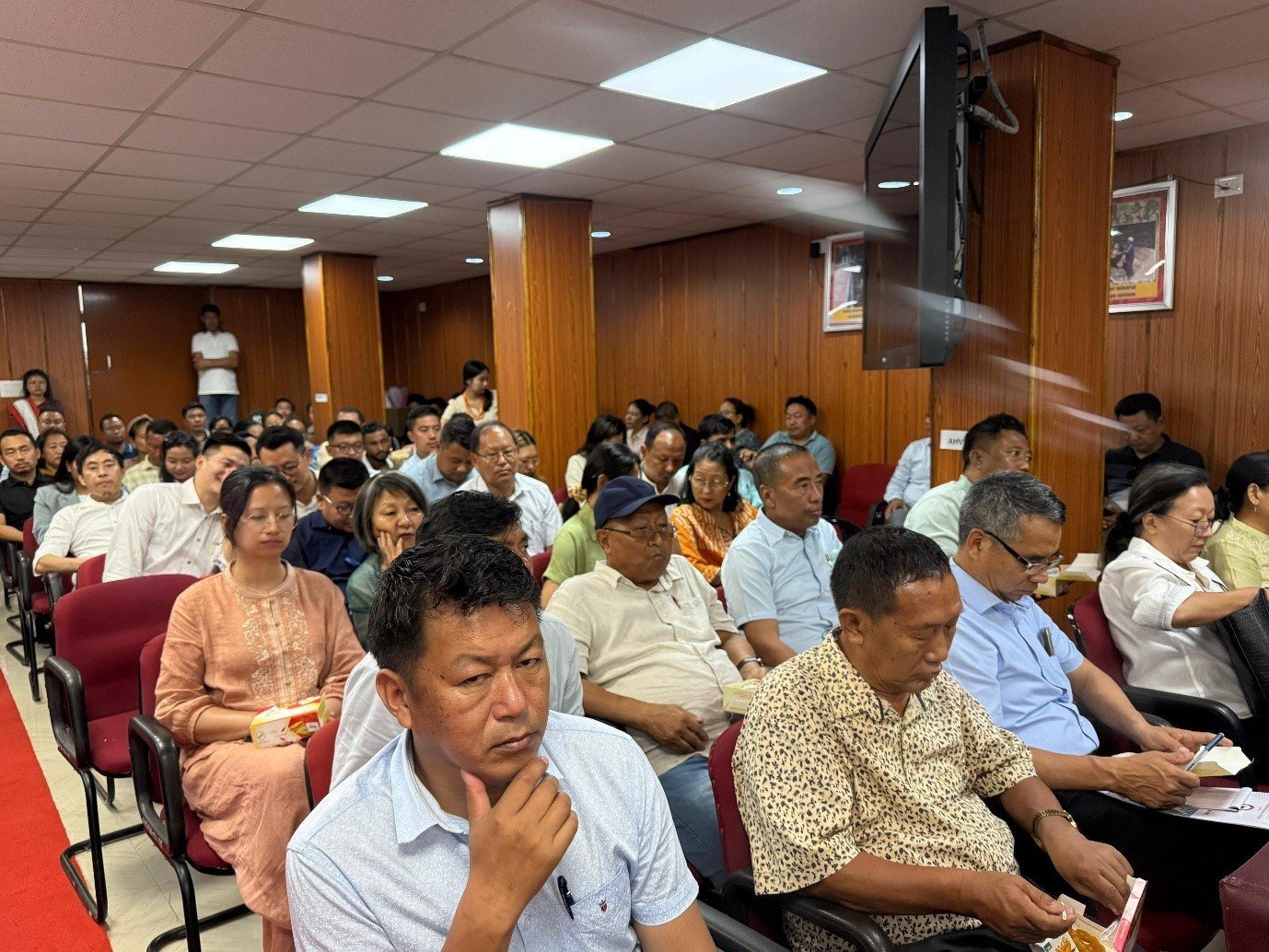A brainstorming session focused on strengthening the livestock sector in Nagaland under the Viksit Krishi Sankalp Abhiyan (VKSA) was held on Thursday at the Conference Hall of ICAR-NRC on Mithun, Jharnapani, Medziphema. The event was organized by ICAR-NRC on Mithun in collaboration with ICAR Nagaland Centre and the state department of Animal Husbandry and Veterinary Services.
Guest of honour, Vikeyie Kenya, Commissioner and Secretary for Department of Animal Husbandry highlighted the socio-economic and cultural significance of livestock in Nagaland, especially among its 17 tribes. He emphasized the need to improve indigenous breeds such as Thudo cattle, Sumi Ne goat, Tenyi Vo pig, and Mithun, prized for their meat quality and cultural value.
He pointed out that modernizing piggery and poultry farming offers opportunities, particularly for rural women, and could help reduce urban migration. However, challenges such as lower productivity of indigenous breeds, hilly terrain, poor infrastructure, and lack of cold storage continue to limit commercial growth.
Kenya also raised concerns about African Swine Fever outbreaks, underscoring the need for better biosecurity and disease surveillance. He highlighted implementation challenges in Central government schemes, which often are not suitable for hilly regions such as Nagaland, and called for flexible, region-specific policies. He added that while the Entrepreneur Development Program under NLM has attracted youth, marginal farmers are often left out due to existing funding norms.
MLA and advisor for Agriculture Mhathung Yanthan, in his address, reiterated Nagaland’s commitment to achieving Viksit Nagaland by 2047, stating that collaborative efforts are already underway with a roadmap developed through consultations. He emphasized livestock’s growing popularity, noting that under CMMFI, 67.2% of 1,655 beneficiaries have chosen livestock-based ventures—59.3% piggery, 5.7% poultry, and 5.9% goatery.
He encouraged all stakeholders to propose bold, practical, scalable, and farmer-centric ideas, particularly focusing on tribal livelihoods and field agriculture.
Director ICAR-NRC on Mithun Dr. Girish Patil S underlined the national vision of achieving Viksit Bharat by 2047, which requires 8% annual GDP growth, with agriculture contributing through 5% growth—where livestock plays a crucial role, especially in Nagaland.
He pointed out that meat is the major animal protein source in the state (14 kg per capita vs. 7 kg nationally), while milk consumption is low (51g vs. 429g nationally). He raised concern over the findings of the 20th Livestock Census, which reported a 28% drop in livestock population, with some species like sheep, goats, and Mithun experiencing declines of up to 91%.
Given Nagaland’s growing economy and rising income levels (SGDP up from ₹12,065 crore in 2011–12 to ₹45,000 crore in 2024–25), he said the demand for livestock products is set to rise. Enhancing productivity and production is necessary to reduce dependence on imports, boost rural employment, and ensure nutritional security.

Patil further emphasized the need to integrate livestock development with sustainable agriculture practices, noting that farmyard manure is essential for soil fertility in hilly areas. He stated that the session aimed to address the current challenges and draw up strategic directions for livestock development under the Amrit Kaal.
Head ICAR RC for NEH, Nagaland Centre and Nodal Officer VKSA Nagaland Dr. H Kalita explained that the VKSA, launched on May 29 last, is a nationwide agricultural movement aimed at realizing Viksit Bharat @ 2047. He proudly noted that Nagaland has actively embraced the campaign, demonstrating the spirit of “One Nation, One Team, One Agriculture.”
Despite adverse weather and terrain, the campaign reached 1,110 villages in just two weeks and engaged 1,10,861 farmers (62,387 men and 48,634 women), it was informed. Thirty-six teams from ICAR Institutes, 11 KVKs, Central Agricultural University, Nagaland University, and State Departments conducted intensive outreach, supported by eight VIPs and elected representatives.
Download Nagaland Tribune app on Google Play

The campaign emphasized grassroots engagement, technology dissemination, and farmer participation. Teams brought scientific knowledge directly to farmers and documented local innovations, technology gaps, and community needs to inform future policy.
Dr. Kalita stressed that VKSA showcased Nagaland’s agro-biodiversity, traditional knowledge, and resilient rural communities. It empowered SHGs, FPOs, youth, and women, and reaffirmed that agriculture is not just an occupation, but a nation-building force. He concluded that this was not an end, but the beginning of a more connected rural ecosystem.
Ninong Ering, HMLA and advisor Department of Hydro Power, Government of Arunachal Pradesh, also shared brief remarks highlighting the importance of regional cooperation and sustainable livestock development, particularly with Mithun, of which Arunachal Pradesh holds 90% of the national population.
Head of KVK Dimapur Dr. Phool Kumari expressed gratitude to all dignitaries, participants, organizers, and especially the farming communities for their active involvement and support.

